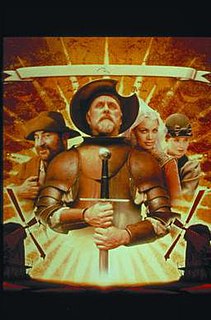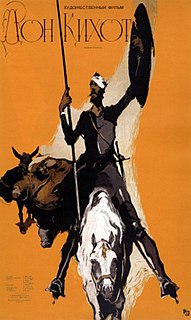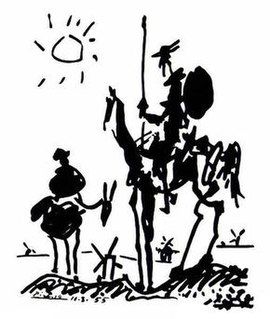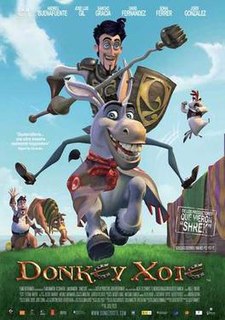See also
- Catherine Samba-Panza (born 1956), interim President of the Central African Republic from 2014 to 2016
- Pansa (disambiguation)
- Panzo (disambiguation)
Panza is a town in Italy Panza or La Panza may also refer to:
People
Things
Places

The Ingenious Gentleman Don Quixote of La Mancha, or just Don Quixote, is a Spanish novel by Miguel de Cervantes. It was originally published in two parts, in 1605 and 1615. A founding work of Western literature, it is often labeled as the first modern novel and is considered one of the greatest works ever written. Don Quixote also holds the distinction of being one of the most-translated books in the world.

Man of La Mancha is a 1965 musical with a book by Dale Wasserman, music by Mitch Leigh, and lyrics by Joe Darion. It is adapted from Wasserman's non-musical 1959 teleplay I, Don Quixote, which was in turn inspired by Miguel de Cervantes and his 17th-century novel Don Quixote. It tells the story of the "mad" knight Don Quixote as a play within a play, performed by Cervantes and his fellow prisoners as he awaits a hearing with the Spanish Inquisition. The work is not and does not pretend to be a faithful rendition of either Cervantes' life or Don Quixote. Wasserman complained repeatedly about people taking the work as a musical version of Don Quixote.

Lost in La Mancha is a 2002 documentary film about the making of Terry Gilliam's first attempt at The Man Who Killed Don Quixote. His effort was a film adaptation of the 1605/1615 novel Don Quixote by Miguel de Cervantes. The documentary was shot in 2000 during Gilliam's first attempt to make the film, as an intended work of the genre known as the "making-of". But Gilliam's failure to complete his movie resulted in the documentary filmmakers retitling their work as Lost in la Mancha and releasing it independently.
Insula is the Latin word for "island" and may refer to:

Sancho Panza is a fictional character in the novel Don Quixote written by Spanish author Don Miguel de Cervantes Saavedra in 1605. Sancho acts as squire to Don Quixote and provides comments throughout the novel, known as sanchismos, that are a combination of broad humour, ironic Spanish proverbs, and earthy wit. "Panza" in Spanish means "belly".

Alonso Fernández de Avellaneda is the pseudonym of a man who wrote a sequel to Cervantes' Don Quixote. The identity of Avellaneda has been the subject of many theories, but there is no consensus on who he was. It is not clear that Cervantes knew who Avellaneda was although he knew that it was a pseudonym and that the volume's publication information was false. One theory holds that Avellaneda's work was a collaboration by friends of Lope de Vega. Another theory is that it was by Gerónimo de Passamonte, the real-life inspiration for the character Ginés de Pasamonte of Part I.

Plaza de España is a large square and popular tourist destination located in central Madrid, Spain at the western end of the Gran Vía. It features a monument to Miguel de Cervantes Saavedra and is adjacent to two of Madrid's most prominent skyscrapers. Additionally, the Palacio Real is only a short walk south from the plaza. Currently the plaza is under renovation. It is scheduled reopen on February 2021.

Man of La Mancha is a 1972 film adaptation of the Broadway musical Man of La Mancha by Dale Wasserman, with music by Mitch Leigh and lyrics by Joe Darion. The musical was suggested by the classic novel Don Quixote by Miguel de Cervantes, but more directly based on Wasserman's 1959 non-musical television play I, Don Quixote, which combines a semi-fictional episode from the life of Cervantes with scenes from his novel.

Giovanni Meli was an Italian poet. After studying philosophy and medicine he worked as a doctor in Cinisi in the province of Palermo. It was during this early period of his life that he discovered the bucolic poets and the poetic worth of his native Sicilian which he used thereafter in all of his literary works.

Don Quixote is a 2000 television film made by Hallmark Entertainment and distributed by TNT. It was directed by Peter Yates, and the teleplay, by John Mortimer, was adapted from Miguel de Cervantes' classic novel Don Quixote. The film was shown in three parts in Europe but in one installment in the U.S.
Don Quixote (1933) is the English title of a film adaptation of the classic Miguel de Cervantes novel, directed by Georg Wilhelm Pabst, starring the famous operatic bass Feodor Chaliapin. Although the film stars Chaliapin, it is not an opera. However, he does sing four songs in it. It is the first sound film version of the Spanish classic. The supporting cast in the English version includes George Robey, René Donnio, Miles Mander, Lydia Sherwood, Renée Valliers, and Emily Fitzroy. The film was made in three versions—French, English, and German—with Chaliapin starring in all three versions.

Don Quixote or Don Quixote de la Mancha is the first sound film version in Spanish of the great classic novel by Miguel de Cervantes Saavedra. It was directed and adapted by Rafael Gil and released in 1947. A huge undertaking for Spanish cinema in its day, it was the longest film version of the novel up to that time, and very likely the most faithful, reverently following the book in its dialogue and order of episodes, unlike G.W. Pabst's 1933 version and the later Russian film version, which scrambled up the order of the adventures as many film versions do. Characters such as Cardenio, Dorotea, and Don Fernando, which are usually omitted because their respective subplots have little to do with the main body of the novel, were kept in this film.
Don Quixote is an unfinished film project written, co-produced and directed by Orson Welles. Principal photography took place between 1957 and 1969. Test footage was filmed as early as 1955, second-unit photography was done as late as 1972, and Welles was working on the film intermittently until his death in 1985. The film was eventually edited by Jesús Franco and was released in 1992, to mixed reviews.

Don Quixote is a 1957 Soviet drama film directed by Grigori Kozintsev. It is based on Evgeny Shvartz's stage adaptation of Miguel de Cervantes's novel of the same name. It was entered into the 1957 Cannes Film Festival.

Don Quixote is a 1955 sketch by Pablo Picasso of the Spanish literary hero and his sidekick, Sancho Panza. It was featured on the August 18–24 issue of the French weekly journal Les Lettres Françaises in celebration of the 350th anniversary of the first part, published in 1605, of the Miguel de Cervantes novel Don Quixote. Made on August 10, 1955, the drawing Don Quixote was in a very different style than Picasso’s earlier Blue, Rose, and Cubist periods.

Donkey Xote is a 2007 3D computer-animated children's adventure comedy film produced by Lumiq Studios. A co-production between Spain and Italy, the film is directed by José Pozo and written by Angel Pariente, based on the Miguel de Cervantes novel Don Quixote, and features the voices of Andreu Buenafuente, David Fernández, Sonia Ferrer and José Luis Gil. The film is a mockbuster as the lead character Rucio bears an intentional resemblance to Donkey from the Shrek film series.
Don Quijote cabalga de nuevo is a 1973 Spanish-Mexican comedy film directed by Roberto Gavaldón, loosely based on Miguel de Cervantes's novel Don Quixote and starring Cantinflas as Sancho Panza, Fernando Fernán Gómez as Don Quixote, and María Fernanda D'Ocón as Dulcinea.

Don Chisciotte and Sancio Panza is an Italian 1968 comedy film written and directed by Giovanni Grimaldi and starring the comedy duo formed by Franco Franchi and Ciccio Ingrassia. It is based on the Miguel de Cervantes' novel Don Quixote.